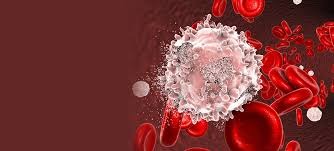Hearing the words “blood cancer” can be terrifying, but with today’s medical advancements, there’s more hope than ever before. Modern treatments, improved survival rates, and early diagnosis are changing the outlook for patients every day. So, the big question is — is blood cancer curable?
In this article, The Web Health explores what blood cancer is, the types, treatments, and current scientific progress that’s bringing patients closer to long-term remission and potential cures.
Understanding Blood Cancer
Blood cancer, also known as hematologic cancer, affects the production and function of blood cells. It usually begins in the bone marrow — the soft tissue inside bones where blood cells are made.
In healthy people, the bone marrow produces white blood cells, red blood cells, and platelets in a controlled manner. However, in blood cancer, abnormal cells grow uncontrollably, interfering with normal blood function and the immune system’s ability to fight infections. With timely diagnosis and advanced treatment, many cases of blood cancer curable possibilities have emerged, giving patients new hope for recovery and long-term remission.
The three main types of blood cancer are:
- Leukemia – Begins in the bone marrow and affects white blood cells.
- Lymphoma – Starts in the lymphatic system, which helps fight infection.
- Myeloma – Develops in plasma cells, a type of white blood cell that produces antibodies.
Understanding which type you have is crucial, as it determines treatment and prognosis.
Is Blood Cancer Curable?
The short answer is sometimes — depending on the type, stage, and individual health condition.
Thanks to modern medicine, some types of blood cancer can now be cured or managed for many years, allowing patients to live long and fulfilling lives. Others can be treated into remission, meaning the cancer is under control but not completely gone.
Here’s a closer look at what research and clinical experience say about each major type:
1. Leukemia: Improving Cure Rates
Leukemia was once considered one of the most difficult cancers to treat, but progress has been remarkable. Today, survival rates for many forms of leukemia have increased dramatically.
- Acute Lymphoblastic Leukemia (ALL) – Children respond particularly well to treatment, with cure rates exceeding 85% in some cases.
- Acute Myeloid Leukemia (AML) – Treatments are improving, with targeted therapies and stem cell transplants offering hope for long-term remission.
- Chronic Leukemia (CLL, CML) – These forms often progress slowly and can be controlled for years using oral medications like imatinib, which revolutionized treatment outcomes.
So, when asking if blood cancer is curable, leukemia is one of the most promising areas — especially with early detection and advanced therapies.
2. Lymphoma: High Recovery Potential
Lymphoma is divided into Hodgkin lymphoma (HL) and Non-Hodgkin lymphoma (NHL). Both have effective treatments available.
- Hodgkin Lymphoma: This type has one of the highest cure rates of all cancers. With chemotherapy and radiation, up to 90% of early-stage patients achieve remission.
- Non-Hodgkin Lymphoma: While there are many subtypes, many respond well to treatment using targeted antibodies like Rituximab and stem cell transplants.
In general, lymphoma is one of the most curable blood cancers, especially when diagnosed early and treated with modern therapies.
3. Myeloma: Long-Term Management and Remission
Multiple Myeloma is currently not considered fully curable, but treatments have advanced tremendously. Many patients now live for 10 years or more with effective therapy.
Medications like lenalidomide and bortezomib, along with stem cell transplants, have turned myeloma into a manageable chronic disease. Continuous research at The Web Health and global medical centers is pushing toward long-term remission — and even potential cures.
Key Points to Remember
- The question “Is blood cancer curable?” depends on the type and individual health factors.
- Early diagnosis greatly improves treatment success.
- Modern therapies like immunotherapy and bone marrow transplants are transforming survival rates.
- Continuous follow-up care is essential, even after remission.
- Support systems — emotional, nutritional, and medical — play a huge role in recovery.
Latest Medical Breakthroughs
Recent advancements are offering new hope to patients with all forms of blood cancer. Let’s look at some of the most promising innovations:
1. Immunotherapy
This treatment uses the body’s own immune system to fight cancer. CAR T-cell therapy, for example, has shown outstanding results in some leukemia and lymphoma cases, helping patients who didn’t respond to other treatments achieve remission.
2. Targeted Therapy
Unlike traditional chemotherapy, targeted drugs attack specific cancer cells while sparing healthy ones. Medications like imatinib, rituximab, and ibrutinib have transformed treatment outcomes for many patients.
3. Bone Marrow and Stem Cell Transplants
For some blood cancers, replacing diseased bone marrow with healthy donor cells can completely eliminate the cancer and lead to a cure.
4. Precision Medicine
Doctors now use genetic testing to tailor treatment plans to each patient’s unique DNA profile. This increases the chances of success while reducing side effects.
Living with Hope and Resilience
Living with blood cancer can be emotionally and physically challenging, but survival rates are steadily improving. Many people go into remission, live for decades, and return to normal activities.
Here’s what The Web Health recommends for patients and families:
- Follow all treatment plans carefully — take medications as directed and attend follow-up visits.
- Adopt a healthy lifestyle — eat nutritious foods, exercise moderately, and stay hydrated.
- Get emotional support — counseling or support groups can ease anxiety and improve mental well-being.
- Stay informed — understanding your condition helps you make confident health decisions.
Early Detection: The Key to Better Outcomes
One of the most important factors in determining whether blood cancer is curable is early diagnosis. Regular blood tests, awareness of symptoms, and seeking medical attention promptly can make a huge difference.
Common early symptoms include:
- Fatigue and weakness
- Frequent infections
- Unexplained bruising or bleeding
- Night sweats or fever
- Swollen lymph nodes
If you notice any of these symptoms, consult your doctor right away. Early-stage cancers respond better to treatment and have higher chances of remission or cure.
The Future of Blood Cancer Treatment
The future looks bright for patients with blood cancer. Clinical trials are underway for new drugs, gene therapies, and vaccine-based treatments that could one day make blood cancer curable for all types.
Scientists and organizations worldwide, including research partners mentioned by The Web Health, are dedicated to discovering permanent cures and improving patient quality of life.
Final Thoughts
So, is blood cancer curable? The answer is increasingly positive. While not every type can be completely cured yet, many forms of blood cancer can be successfully treated or managed for years with today’s advanced therapies.
Hope is stronger than ever before. With early diagnosis, proper treatment, and ongoing research, thousands of people are living healthy, cancer-free lives after diagnosis.
At The Web Health, we believe that knowledge, awareness, and medical progress are the keys to beating cancer — and empowering patients to live with strength and confidence every step of the way.






